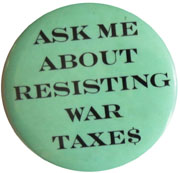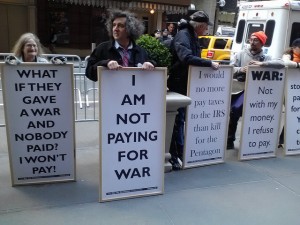This string came off the war tax resistance listserve, which you can sign up for here. Ask questions, start a discussion topic, like Angie did, or ask for feedback about an issue related to war tax resistance.
Angie got it started:
 I’m starting this thread to see if anyone has any stories they’d like to share about positive responses, especially pleasantly surprising ones, that they’ve received regarding their war tax resistance. For instance, is there a time when you shared your war tax resistance activities or beliefs with a person or group and was met with more curiosity, support, or encouragement, than you expected? Is there anything specific in the way you handled it that you think may have led to that particular response?
I’m starting this thread to see if anyone has any stories they’d like to share about positive responses, especially pleasantly surprising ones, that they’ve received regarding their war tax resistance. For instance, is there a time when you shared your war tax resistance activities or beliefs with a person or group and was met with more curiosity, support, or encouragement, than you expected? Is there anything specific in the way you handled it that you think may have led to that particular response?
I’m looking to gradually become much more open about my war tax resistance, and I think sharing things like this could be encouraging to all of us. 🙂
Larry:
Yes indeed. E.g., the time when I announced in the College newspaper that my salary had been levied, and several colleagues I wouldn’t have guessed would be sympathetic came up to me, not only to express sympathy, but also to ask me whether I needed financial support. E.g., and later, when the then President of the College, herself a Quaker, invited me to draft a letter she could send to the IRS, asking it to withdraw the then levy on the ground that freedom of conscience was a core value of the academy. No response from the IRS, and the levy went on apace, but I’m not aware of any other College President who sent such a letter.
Ginny:
Yes, my partner of 20 years was originally attracted to me due to the WTR.
Sue:
Over the years many people have told me how much they admire that I am a war tax resister and that I talk about it openly with friends, family and co-workers and write a letter to the editor about it each Spring. One person I know who I think of as fairly straight told me he saved one of those letters to the editor from the local paper from a long time ago and it’s still on his refrigerator door. When I was adopting my daughter from India I had a lot of trouble with the INS, US Immigration. Many people kept thinking it was the IRS that was causing the issues and that being a WTR was somehow the reason I was having some issues, I just kept explaining that the IRS was not the problem, it was the INS!!
My two long term partners I met due to being a peacenik and war tax resister. My first partner I met at a War Resisters League conference, my second partner I met tabling at an event. Both of them admired my war tax resistance. They have been great allies.
Mary:
When I was levied while working as a neighborhood organizer based in a shelter for homeless families, I wrote a letter to the board and staff explaining why I was being levied and asked that they consider not complying.Several staff members were formerly homeless women, and a couple asked me questions out of curiosity. They said that it made sense to not pay for war and instead fund human needs. One said something like “I never knew you could do that — we all should do it!”
Some years later, when I worked organizing low-income tenants for a more radical small organization, the IRS visited my workplace and then levied me. I wrote a letter to the Steering Committee and gave them info on organizational tax resistance. They wrote the IRS saying basically that this was a matter between the IRS and our employee, we don’t want to get involved. After that, the IRS seemed to lay off —I didn’t hear from them except for the form letters they send out.
Dana:
I just finished up a 5 day kids camp and one of the other instructors said to me, “Dana you are so radical.” I wasn’t sure what she meant, but then she went on, “You don’t pay taxes.” I was glad she thought of me as a radical (she’s pretty radical herself), but I thought, “That’s it, just because I don’t pay taxes? That’s not radical……” For one thing, I think I’m too old to have to pay taxes; I’m not sure how that works but in any case the IRS and I are not on speaking terms. But, I was recently reminded about Trident submarines: one sub carriers 14 missiles, each missile has up to 14 warheads, 14×14 = up to 196 cities destroyed by one sub. Now that’s radical! And they think I’m radical because I resist paying for this slaughter? I think “they” are radical for doing what they are told to do when it is so evil, or ignorant, or both.
Eleanor:
“Radical” means that it goes to the root. A peace activist who refuses to pay for war is going to the root: if we don’t pay for this expensive foolery, it can’t be done. That doesn’t mean that there aren’t other ways to go to the root: not signing up to fight, or refusing to be drafted, but this is certainly one of them.
Ruth:
One of my favorites was doing an interview about WTR once with PressTV, which was an Iran media outlet in the U.S. There was a reporter and a camera person. The camera guy didn’t say anything during the interview, but as he was packing up to leave he stopped to say, “I have Thoreau’s ‘On the Duty of Civil Disobedience’ in my phone and read it almost every day when I’m waiting for something or traveling.”
Peter:
When I first started teaching at Saint Mary’s College 55 years ago, the IRS started levying my wages. The finance officer recommended that I be fired since I was a disgrace to the college. Fortunately, my department chair stood up for me and I continued to teach there for 35 years. When this finance officer retired, he wrote a nice letter to me saying how much he admired my principled stand.
Errol:
In 1994 my son was accepted to Cornell on scholarship but the school required a copy of my tax return. I told them I was a war tax resister, a conscientious Quaker, and argued that they should support my witness because the school’s founder was a Quaker.
Eventually they gave him the scholarship with the caveat that if if the feds audited my son’s account I’d be in trouble.
Add your story in the comments, which are open for about 2 weeks.

When I told my folks that I was taking the step of becoming a war tax resister, they were a bit taken aback, even though they were longtime civil rights and anti-war activists in their own right. They understood my reasons, just not the method. But, then, my mom decided she supported the idea of a peace tax fund, and on more than one tax day, she made copies of the FCNL tax day flier and went down to the post office drive-up box in her town and handed those fliers to folks mailing their tax returns. She also organized a penny poll at her downtown library on another tax day. I was very moved that she did those things in solidarity with me even when she wasn’t in total agreement with wtr as a strategy.
When I was assistant general manager of Planning and Marketing at CTTRANSIT, the bus service for Hartford, New Haven and Stamford, Connecticut (CT), at a staff meeting the general manager asked each of the senior management to share something that was not on their resume. I shared that I was a WTR. Soon thereafter, the assistant general manager of Maintenance, who had been in my position before, was driving me to the airport so we could fly in his plane to Block Island for lunch (pretty decadent!). He said he would bring me all my work in jail if it came to that. He meant it in a positive way but I think he was also worried that he would have to take on all that work again.
In my career as a programmer/analyst I worked as a contractor/consultant for some years.to avoid withholding. I tried to use the name HDT Consulting (after Henry David Thoreau) but the rules forbade using initials unless they were your own. So I opted for L’Chaim Consulting (“L’Chaim” is a toast meaning “To life!”). When I was not working midweek, I went on hikes with the Sierra Club. As we hiked along, I got into conversations with my fellow hikers, which often led to them asking how come I had free time in the middle of the week. I was happy to explain the connection with my war tax resistance. On several occasions the response was something like, “I admire your position, but I don’t have the balls for that!”